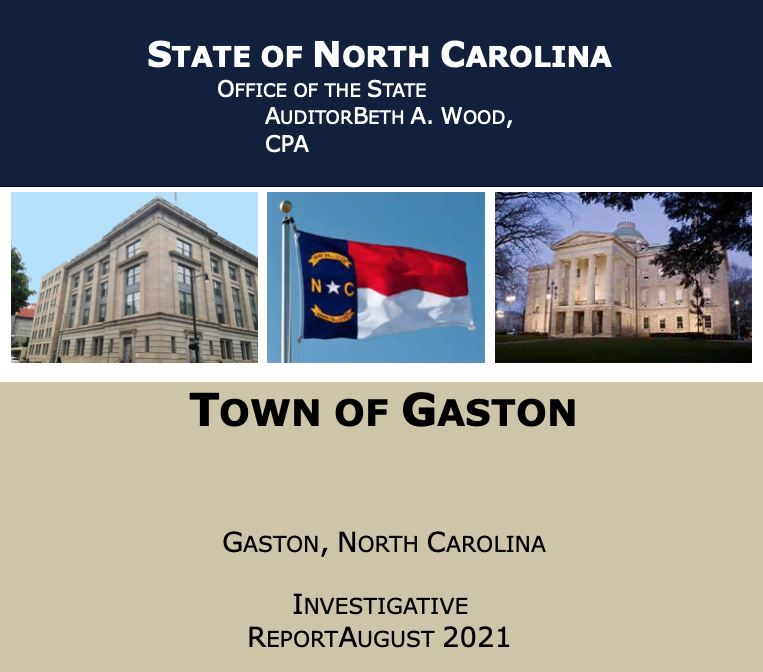Gaston Town Attorney Geoffrey Davis said in an August 11 letter to the North Carolina Office of the State Auditor that the town does not dispute any of the findings in an audit released Thursday.
“In fact, the town hopes that the results of this audit will serve as an opportunity to correct the issues you have discovered through the process and to establish policies and procedures to prevent these situations in the future,” the letter, included in the state document says. “Moreover, the town will cooperate fully with any subsequent investigations as well as any recommendations made by the Local Government Commission in response to your report.”
The Gaston town board met August 9 and discussed the allegations in closed session, Davis said.
(See related story at this link)
The board authorized Davis to draft the response and also took the first steps to address the concerns in the draft report which was sent to the town on July 28.
Davis said he spoke with the assistant clerk as well as members of the board who were present in 2017 when several of the issues first came to their attention.
Davis said the loans made by the clerk were unauthorized and made in violation of town policy. “Moreover, once they were identified, the employees who received the loans were apparently allowed to pay them back based on a verbal agreement.”
More concerning, Davis wrote, “are the actions of the town clerk who issued payroll checks without obtaining a second signature as required by town policy, who was paid vacation pay while still working and who clearly co-mingled funds from her personal accounts with the town’s.”
Davis said as far as the town can tell, the clerk knew or should have known at the time that the above actions were improper and in violation of established law, policies and procedures. “While she bears responsibility for these actions, they would have been caught much earlier had the town board exercised stricter oversight of her actions and in some cases might not have ever taken place.”
The town clerk is no longer employed and a new clerk was sworn in the evening the matter discussed in closed session. “ … I hope that this process will help to illustrate to our new clerk how to ensure best practices when she is dealing with town money. We anticipate the long-delayed 2020 annual audit will soon be delivered to the town and I have discussed the possibility of retaining a CPA to perform a forensic audit to discover any additional errors or unauthorized transactions.”
After the closed session, Davis said the town passed a motion to prohibit the clerk from signing a check to herself, even if that check is co-signed by another authorized person. “Frankly, I was surprised that this policy did not already exist in Gaston.”
The board that evening also discussed at length their options for exercising better oversight over expenditures “and welcome any help or advice your office can provide as we continue to work through this process.”
With respect to the clerk, Davis said, “I believe that we must make an effort to recover these funds but I am waiting until this report is made public before I take action.”
Regarding the transaction involving a town commissioner who who purchased a town mower below fair market value, Davis said, “I believe the facts are exactly as you state, however, I would like to add the following qualification — the commissioner who purchased the lawnmower did not participate in the vote that authorized the private sale.”
The attorney said he believed at the time the board was focused on provisions of state statutes which allow private negotiations and sales for personal property valued under $30,000.
However, Davis said, the board “failed to ensure the offer made by the purchasing commissioner was in line with the fair market value for that asset. I have explained to them how, in light of your findings, this transaction deprived the town of an offer that potentially would have been closer to the fair market value. Additionally, I have explained to them that this situation was made more problematic by the fact that a commissioner was the purchaser in question.”
Davis said in the future he doesn’t believe the current board will attempt to dispose of assets in this fashion. “I have advised them they need to make an effort to obtain fair market value for any town assets they dispose of, even when said disposition occurs under (North Carolina General Statutes).”
Finally, Davis wrote, “I am surprised that the town could not provide a current listing of public works vehicles. This should be relatively easy to remedy and in the future the town should endeavor to keep better records. They should also endeavor to keep better track of their use of vehicles and fuel.”
He said he has discussed creating formal policies regarding vehicles and fuel cards. “These are necessary and will be forthcoming. Once established, I have discussed with individual commissioners ways in which they can ensure that the policies are being followed.”









